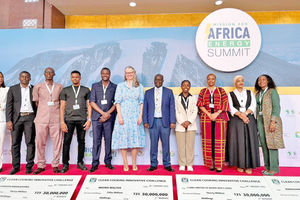
Dar es Salaam. When Deputy Prime Minister and Minister of Energy Dr Doto Biteko formally launched Tanzania’s National Clean Cooking Communication Strategy in Dodoma on 2 June, he made it clear that the campaign marked the beginning of a ten-year journey that targets every household.
He urged implementation to reach the grassroots, insisting that “this strategy must not remain shelved. Its execution should cascade to the lowest government structures, with private sector players, development stakeholders and the media taking active roles.”
Dr Biteko also highlighted the dramatic increase in clean cooking uptake, noting that since the launch of the national strategy in May 2024, usage had risen from 6 to 16 percent.
“Without awareness, there can be no adoption,” he said.
Crucially, Dr Biteko tasked the ministry’s Monitoring and Evaluation Unit with quarterly assessments to ensure the clean cooking strategy stays on track.
“This strategy must not remain shelved,” he repeated, underscoring his insistence that awareness, implementation, and results follow in lockstep.
Following the Dodoma event, the private sector’s response has been swift and substantial. Vice-President Dr Philip Mpango disclosed that ‘a total of 762 institutions across Tanzania have so far transitioned to the use of clean cooking energy,’ of which 267 are private enterprises—demonstrating that businesses are not merely observers but active collaborators.
“The Private sector can equally partner with private individuals to intensify a massive campaign on clean cooking,” he affirmed.
The national distributor Taifa Gas announced that the Marketing and Relations Manager, Mr Oscar Shelukindo, led the donation of 300 gas cylinders—“100 of 38 kg and 200 of 6 kg”—to women fish traders at the Ferry Fish Market in Dar es Salaam, to support cleaner, safer cooking fuel.
He added that a 6 kg LPG cylinder, usually sold at Sh23,000, would be made available to students at Sh20,000, ensuring broader access to safe cooking.
Oryx Gas Tanzania has also made a significant impact. Collaborating with the Dorris Mollel Foundation, they have distributed approximately 24,000 clean cooking solutions to women’s groups, investing more than Sh2 billion.
Oryx’s Managing Director, Benoit Araman, commented on the shifting landscape: “For the last 15 years, clean cooking solution access has been discussed and planned, but now it has become the topic of highest importance.”
But it’s not only large corporations making strides. Small and medium-sized enterprises (SMEs) are providing innovative, localised solutions.
The CookFund, operated by UNCDF and funded by the EU, has extended grants and technical support to SMEs, enabling them to distribute electric stoves and improved biomass units.
One beneficiary, SESCOT, successfully broadened its market following CookFund backing—proving how private innovation can support national goals.
And there is a rising wave of novel finance models entering the clean cooking space. In Kenya, M‑Gas has piloted LPG metering and pay‑as‑you‑cook systems. These approaches are now gaining momentum in Tanzania, allowing families to pay small, incremental amounts rather than covering large upfront costs. Similarly, some firms are linking purchases to carbon credit schemes—subsidising equipment in exchange for verified environmental impact.
Institutional uptake tells a powerful story. Of the 762 institutions now using clean cooking, nearly 270 belong to the private sector—spanning schools, hotels, VETA colleges, hospitals, prisons and more. In Dodoma alone, nine prisons, three VETA colleges and nine boarding schools have fully embraced clean cooking technology, creating bulk demand that private providers are ready to meet, thereby supporting scale and sustainability.
Balancing supply and demand requires more than hardware. It also demands leadership, oversight and public trust. As such, Permanent Secretary Felchesmi Mramba presented a powerful vision at the strategy’s launch: “This is not just about energy. It's about health, environment, and equity.”
Mr Mramba also highlighted the comprehensive nature of the communications strategy, noting it is built on a foundation of multi‑channel outreach—from radio, television and social media, to SMS, community events and faith-based engagement.
It includes quarterly monitoring and stakeholder review forums and even a Crisis Communication Plan to counter misinformation.
“Done right, clean cooking will no longer be a privilege of the few but a standard for all Tanzanians,” he said.
Both government officials agree that awareness must translate into adoption through functional markets.
Private sector stakeholders are responding precisely to those needs, offering induction plates, subsidy schemes, leasing models and cylinder-exchange points to overcome the most common adoption barriers.
The ministry of Energy, with development partners, has launched Pika Smart, a nationwide campaign promoting clean cooking energy, especially electricity.Launched on 13 June 2025 by Commissioner for Electricity and Renewable Energy Mr Innocent Luoga, the campaign is backed by UKAID via MECS.
Mr Luoga said, “This campaign is a key element of the government’s plan to ensure that 80 percent of Tanzanian households adopt clean cooking energy by 2034.”
He added, “The Julius Nyerere Hydropower Plant has boosted our capacity to 4,031 megawatts, with power in all 12,318 villages.” Modern cookers are “safe, cost-effective and efficient.”


